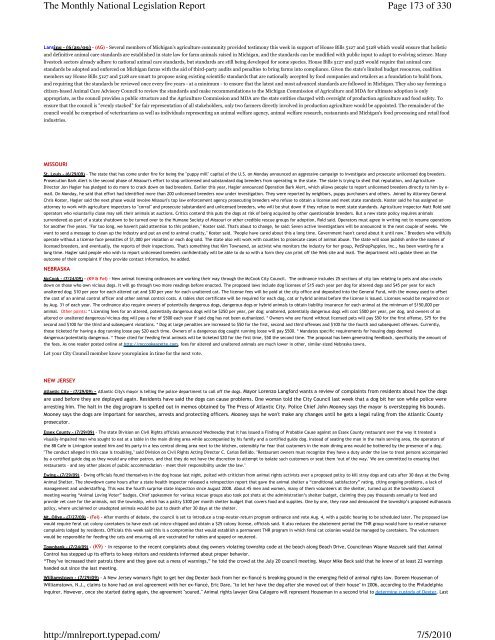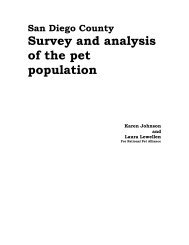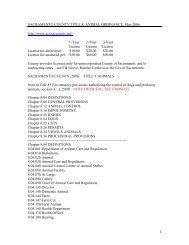Page 1 of 330 The Monthly National Legislation Report 7/5/2010 ...
Page 1 of 330 The Monthly National Legislation Report 7/5/2010 ...
Page 1 of 330 The Monthly National Legislation Report 7/5/2010 ...
You also want an ePaper? Increase the reach of your titles
YUMPU automatically turns print PDFs into web optimized ePapers that Google loves.
<strong>The</strong> <strong>Monthly</strong> <strong>National</strong> <strong>Legislation</strong> <strong>Report</strong>http://mnlreport.typepad.com/<strong>Page</strong> 173 <strong>of</strong> <strong>330</strong>7/5/<strong>2010</strong>Lansing - (6/29/09) - (AG) - Several members <strong>of</strong> Michigan's agriculture community provided testimony this week in support <strong>of</strong> House Bills 5127 and 5128 which would ensure that holisticand definitive animal care standards are established in state law for farm animals raised in Michigan, and the standards can be modified with public input to adapt to evolving science. Manylivestock sectors already adhere to national animal care standards, but standards are still being developed for some species. House Bills 5127 and 5128 would require that animal carestandards be adopted and enforced on Michigan farms with the aid <strong>of</strong> third-party audits and penalties to bring farms into compliance. Given the state's limited budget resources, coalitionmembers say House Bills 5127 and 5128 are smart to propose using existing scientific standards that are nationally accepted by food companies and retailers as a foundation to build from,and requiring that the standards be reviewed once every five years - at a minimum - to ensure that the latest and most advanced standards are followed in Michigan. <strong>The</strong>y also say forming acitizen-based Animal Care Advisory Council to review the standards and make recommendations to the Michigan Commission <strong>of</strong> Agriculture and MDA for ultimate adoption is onlyappropriate, as the council provides a public structure and the Agriculture Commission and MDA are the state entities charged with oversight <strong>of</strong> production agriculture and food safety. Toensure that the council is "evenly stacked" for fair representation <strong>of</strong> all stakeholders, only two farmers directly involved in production agriculture would be appointed. <strong>The</strong> remainder <strong>of</strong> thecouncil would be comprised <strong>of</strong> veterinarians as well as individuals representing an animal welfare agency, animal welfare research, restaurants and Michigan's food processing and retail foodindustries.MISSOURISt. Louis - (6/29/09) - <strong>The</strong> state that has come under fire for being the "puppy mill" capital <strong>of</strong> the U.S. on Monday announced an aggressive campaign to investigate and prosecute unlicensed dog breeders.Prosecution Bark Alert is the second phase <strong>of</strong> Missouri's effort to stop unlicensed and substandard dog breeders from operating in the state. <strong>The</strong> state is trying to shed that reputation, and AgricultureDirector Jon Hagler has pledged to do more to crack down on bad breeders. Earlier this year, Hagler announced Operation Bark Alert, which allows people to report unlicensed breeders directly to him by e-mail. On Monday, he said that effort had identified more than 200 unlicensed breeders now under investigation. <strong>The</strong>y were reported by neighbors, puppy purchasers and others. Joined by Attorney GeneralChris Koster, Hagler said the next phase would involve Missouri's top law enforcement agency prosecuting breeders who refuse to obtain a license and meet state standards. Koster said he has assigned anattorney to work with agriculture inspectors to "corral" and prosecute substandard and unlicensed breeders, who will be shut down if they refuse to meet state standards. Agriculture inspector Matt Rold saidoperators who voluntarily close may sell their animals at auctions. Critics contend this puts the dogs at risk <strong>of</strong> being acquired by other questionable breeders. But a new state policy requires animalssurrendered as part <strong>of</strong> a state shutdown to be turned over to the Humane Society <strong>of</strong> Missouri or other credible rescue groups for adoption, Rold said. Operators must agree in writing not to resume operationsfor another five years. "For too long, we haven't paid attention to this problem," Koster said. That's about to change, he said: Seven active investigations will be announced in the next couple <strong>of</strong> weeks. "Wewant to send a message to clean up the industry and put an end to animal cruelty," Koster said. "People have cared about this a long time. Government hasn't cared about it until now." Breeders who willfullyoperate without a license face penalties <strong>of</strong> $1,000 per violation or each dog sold. <strong>The</strong> state also will work with counties to prosecute cases <strong>of</strong> animal abuse. <strong>The</strong> state will soon publish online the names <strong>of</strong>licensed breeders, and eventually, the reports <strong>of</strong> their inspections. That's something that Kim Townsend, an activist who monitors the industry for her group, PetShopPuppies, Inc., has been wanting for along time. Hagler said people who wish to report unlicensed breeders confidentially will be able to do so with a form they can print <strong>of</strong>f the Web site and mail. <strong>The</strong> department will update them on theoutcome <strong>of</strong> their complaint if they provide contact information, he added.NEBRASKAMcCook - (7/24/09) - (K9 & Fel) - New animal licensing ordinances are working their way through the McCook City Council. <strong>The</strong> ordinance includes 25 sections <strong>of</strong> city law relating to pets and also cracksdown on those who own vicious dogs. It will go through two more readings before enacted. <strong>The</strong> proposed laws include dog licenses <strong>of</strong> $15 each year per dog for altered dogs and $45 per year for eachunaltered dog; $10 per year for each altered cat and $30 per year for each unaltered cat. <strong>The</strong> license fees will be paid at the city <strong>of</strong>fice and deposited into the General Fund, with the money used to <strong>of</strong>fsetthe cost <strong>of</strong> an animal control <strong>of</strong>ficer and other animal control costs. A rabies shot certificate will be required for each dog, cat or hybrid animal before the license is issued. Licenses would be required on orby Aug. 31 <strong>of</strong> each year. <strong>The</strong> ordinance also require owners <strong>of</strong> potentially dangerous dogs, dangerous dogs or hybrid animals to obtain liability insurance for each animal at the minimum <strong>of</strong> $150,000 peranimal. Other points: * Licensing fees for an altered, potentially dangerous dogs will be $250 per year, per dog; unaltered, potentially dangerous dogs will cost $500 per year, per dog, and owners <strong>of</strong> analtered or unaltered dangerous/vicious dog will pay a fee <strong>of</strong> $500 each year if said dog has not been euthanized. * Owners who are found without licensed pets will pay $50 for the first <strong>of</strong>fense, $75 for thesecond and $100 for the third and subsequent violations. * Dog at large penalties are increased to $50 for the first, second and third <strong>of</strong>fenses and $100 for the fourth and subsequent <strong>of</strong>fenses. Currently,those ticketed for having a dog running loose pay $20 each time. Owners <strong>of</strong> a dangerous dog caught running loose will pay $500. * Mandates specific requirements for housing dogs deemeddangerous/potentially dangerous. * Those cited for feeding feral animals will be ticketed $20 for the first time, $50 the second time. <strong>The</strong> proposal has been generating feedback, specifically the amount <strong>of</strong>the fees. As one reader posted online at http://mccookgazette.com, fees for altered and unaltered animals are much lower in other, similar-sized Nebraska towns.Let your City Council member know youropinion in time for the next vote.NEW JERSEYAtlantic City - (7/29/09) - Atlantic City's mayor is telling the police department to call <strong>of</strong>f the dogs. Mayor Lorenzo Langford wants a review <strong>of</strong> complaints from residents about how the dogsare used before they are deployed again. Residents have said the dogs can cause problems. One woman told the City Council last week that a dog bit her son while police werearresting him. <strong>The</strong> halt in the dog program is spelled out in memos obtained by <strong>The</strong> Press <strong>of</strong> Atlantic City. Police Chief John Mooney says the mayor is overstepping his bounds.Mooney says the dogs are important for searches, arrests and protecting <strong>of</strong>ficers. Mooney says he won't make any changes until he gets a legal ruling from the Atlantic Countyprosecutor.Essex County - (7/29/09) - <strong>The</strong> state Division on Civil Rights <strong>of</strong>ficials announced Wednesday that it has issued a Finding <strong>of</strong> Probable Cause against an Essex County restaurant over the way it treated avisually-impaired man who sought to eat at a table in the main dining area while accompanied by his family and a certified guide dog. Instead <strong>of</strong> seating the man in the main serving area, the operators <strong>of</strong>the 88 Cafe in Livingston seated him and his party in a less central dining area next to the kitchen, ostensibly for fear that customers in the main dining area would be bothered by the presence <strong>of</strong> a dog."<strong>The</strong> conduct alleged in this case is troubling," said Division on Civil Rights Acting Director C. Carlos Bellido. "Restaurant owners must recognize they have a duty under the law to treat persons accompaniedby a certified guide dog as they would any other patron, and that they do not have the discretion to attempt to isolate such customers or seat them ‘out <strong>of</strong> the way.' We are committed to ensuring thatrestaurants - and any other places <strong>of</strong> public accommodation - meet their responsibility under the law."Ewing - (7/29/09) - Ewing <strong>of</strong>ficials found themselves in the dog house last night, pelted with criticism from animal rights activists over a proposed policy to kill stray dogs and cats after 30 days at the EwingAnimal Shelter. <strong>The</strong> showdown came hours after a state health inspector released a reinspection report that gave the animal shelter a “conditional satisfactory” rating, citing ongoing problems, a lack <strong>of</strong>management and understaffing. This was the fourth surprise state inspection since August 2008. About 45 men and women, many <strong>of</strong> them volunteers at the shelter, turned up at the township councilmeeting wearing “Animal Loving Voter” badges. Chief spokesmen for various rescue groups also took pot shots at the administration’s shelter budget, claiming they pay thousands annually to feed andprovide vet care for the animals, not the township, which has a paltry $300 per month shelter budget that covers food and supplies. One by one, they rose and denounced the township’s proposed euthanasiapolicy, where unclaimed or unadopted animals would be put to death after 30 days at the shelter.Mt. Olive - (7/27/09) - (Fel) - After months <strong>of</strong> debate, the council is set to introduce a trap-neuter-return program ordinance and vote Aug. 4, with a public hearing to be scheduled later. <strong>The</strong> proposed lawwould require feral cat colony caretakers to have each cat micro-chipped and obtain a $25 colony license, <strong>of</strong>ficials said. It also reduces the abatement period the TNR group would have to resolve nuisancecomplaints lodged by residents. Officials this week said this is a compromise that would establish a permanent TNR program in which feral cat colonies would be managed by caretakers. <strong>The</strong> volunteerswould be responsible for feeding the cats and ensuring all are vaccinated for rabies and spayed or neutered.Townbank - (7/24/09) - (K9) - In response to the recent complaints about dog owners violating township code at the beach along Beach Drive, Councilman Wayne Mazurek said that AnimalControl has stepped up its efforts to keep visitors and residents informed about proper behavior.“<strong>The</strong>y’ve increased their patrols there and they gave out a mess <strong>of</strong> warnings,” he told the crowd at the July 20 council meeting. Mayor Mike Beck said that he knew <strong>of</strong> at least 22 warningshanded out since the last meeting.Williamstown - (7/29/09) - A New Jersey woman's fight to get her dog Dexter back from her ex-fiancé is breaking ground in the emerging field <strong>of</strong> animal rights law. Doreen Houseman <strong>of</strong>Williamstown, N.J., claims to have had an oral agreement with her ex-fiancé, Eric Dare, "to let her have the dog after she moved out <strong>of</strong> their house" in 2006, according to the PhiladelphiaInquirer. However, once she started dating again, the agreement "soured." Animal rights lawyer Gina Calogero will represent Houseman in a second trial to determine custody <strong>of</strong> Dexter. Last




